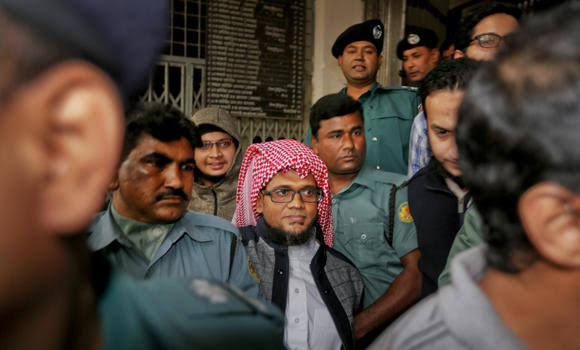Yunus showing true colours : Terrorist of Al Qaeda-linked Ansar Al Islam secretly released from Bangladesh prison

The shadow of terrorism looms large over Bangladesh as Yunus and his advisors have started displaying their true colours. Disturbing reports reveal the clandestine release of convicted jihadist Jikrullah from Kashimpur Central Jail.
Convicted for the brutal murder of blogger Wasikur Rahman Babu in 2015, Jikrullah’s release not only exposes serious lapses in the justice system but also highlights a troubling nexus between extremist elements and influential figures within the country.
With mounting evidence of state complicity by Yunus and his advisors and growing threats to regional stability, this incident signals a grave escalation in the activities of Al Qaeda-linked terrorist groups operating in South Asia.
In the early hours of December 21, 2024, under the cover of night, Kashimpur Central Jail (Part-2) in Gazipur became the epicenter of a clandestine operation.
Authorities there reportedly facilitated the secret release of Jikrullah, one of the convicted killers of blogger Wasikur Rahman Babu and a known operative of the Al Qaeda-affiliated Ansarullah Bangla Team (ABT), now rebranded as Ansar Al Islam.
This release, executed without notifying the nation’s top intelligence agencies, raises serious questions about state complicity and security lapses being promoted by Yunus’s administration.
Waiting outside the prison compound were vehicles carrying armed ABT members, who escorted Jikrullah to an undisclosed location. Credible sources indicate that this operation was coordinated by influential figures, including an advisor to Muhammad Yunus, ABT leader Jashimuddin Rahmani, and Jamaatul-Mujahedin Bangladesh (JMB) chief Major (sacked) Syed Ziaul Haque.
The murder of blogger Wasikur Rahman Babu
On March 30, 2015, blogger Wasikur Rahman Babu was brutally hacked to death in Dhaka by Jikrullah and Ariful Islam, both members of ABT, using meat cleavers.
The killers later confessed to law enforcement agencies that they considered the murder a “religious duty”. Rahman was targeted for his support of secularism and his association with Avijit Roy, another prominent blogger and US citizen, who had been murdered just a month earlier by ABT operatives.
Avijit Roy, a Bangladeshi-American, was attacked alongside his wife, Rafida Ahmed Bonya, on February 26, 2015, while attending the Ekushey Book Fair in Dhaka.
Roy was killed, and Ahmed sustained critical injuries. Following the attack, the US Department of State’s Diplomatic Security Service, through its Rewards for Justice (RFJ) program, announced a US$5 million reward for information leading to those responsible.
Al Qaeda’s role in Bangladesh
Ansarullah Bangla Team, an affiliate of Al Qaeda in the Indian Subcontinent (AQIS), claimed responsibility for these killings. The attack on Avijit Roy and Rafida Ahmed Bonya was further publicized by AQIS leader Asim Umar in a video.
In 2016, the US Department of State designated AQIS as a Foreign Terrorist Organization and sanctioned it under Executive Order 13224.
The secretive release of Jikrullah is not an isolated incident. Reports suggest that his accomplice, Ariful Islam, may also walk free within days under similar covert arrangements.
Both releases underscore a growing trend of leniency toward convicted extremists under the current regime.
Sources reveal that Major (sacked) Syed Ziaul Haque, a notorious jihadist and former Bangladeshi Army officer, continues to wield influence.
After a failed coup attempt in 2011, Zia fled to Pakistan, where he received support from the Inter-Service Intelligence (ISI) agency. He later joined ABT and quickly rose through its ranks, using his military expertise to strengthen the group’s operational capabilities.
Major Zia, who is currently wanted by Bangladeshi and US authorities, reportedly entered Bangladesh along with several ISI operatives and Tehreek-e-Taliban Pakistan (TTP) members.
Since his return, he has coordinated with Jashimuddin Rahmani and maintained communication with imprisoned members of ABT and JMB.
Intelligence reports suggest that Jikrullah, following his release, was transported to the Bangladesh-India border in Comilla district. He and other ABT operatives are allegedly planning cross-border “hit-and-run” attacks targeting RSS and Hindu leaders, journalists, and security personnel in India.
Targets reportedly include prominent figures such as former NSG official Dipanjan Chakraborty and journalists from Republic TV, Zee News, and others.
Additionally, ABT and JMB cells, under AQIS directives, are said to be preparing attacks on temples, churches, hotels, and industrial projects, including those owned by the Adani Group.
The infiltration of Rohingya jihadists into India further amplifies the threat, with ISI leveraging these networks to execute its agenda of regional destabilization.
Rohingya camps as hotbeds of extremism
In Bangladesh, Rohingya refugee camps have become breeding grounds for extremism. Intelligence sources confirm that AQIS and ISI operatives are actively recruiting from these camps, providing weapons and financial support to Rohingya jihadists.
These groups are allegedly planning to launch attacks on the Arakan Army to regain control over the region.
The apparent state complicity in the release of convicted jihadists has drawn widespread condemnation. Security analyst M A Hossain warns that such actions could invite international scrutiny.
“As Jashimuddin Rahmani and Major Zia are wanted by US authorities, the Yunus administration’s overt connections with them will not go unnoticed in Washington”, he said.
While the Biden administration has been criticized for its perceived leniency toward Islamist regimes, a potential return of Donald Trump to the White House in January 2025 could spell trouble for Bangladesh’s current leadership.
Trump is expected to take a hardline stance, imposing sanctions on Muhammad Yunus, his advisors, and other prominent figures accused of fostering terrorism.
The clandestine release of Jikrullah and the broader implications of his reentry into extremist networks raise pressing questions about Bangladesh’s commitment to counterterrorism.
As the nation faces mounting scrutiny over its handling of jihadist threats, the stakes extend far beyond its borders. Regional security, international counterterrorism efforts, and the safety of countless lives hang in the balance.
The urgent need for transparency, accountability, and robust action to dismantle these terror networks cannot be overstated, for complacency now may lead to irreversible consequences for Bangladesh and its neighbors.




